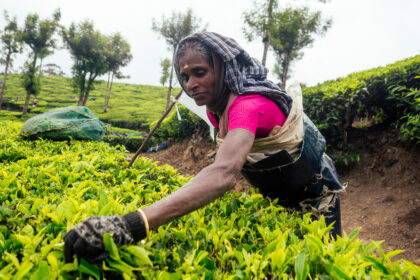As Sri Lanka prepares for the upcoming presidential election on September 21, the tea industry—a key pillar of the nation’s economy—has taken center stage. Tea pickers, who form a vital voting bloc, are determined to elect a leader who will address their long-standing grievances about poor working conditions and inadequate wages.
The Importance of Tea Pickers in Sri Lanka’s Economy
Tea is Sri Lanka’s primary export, contributing $1.3 billion annually to the economy. Known for producing some of the world’s finest black tea under the label “Ceylon Tea,” the country’s international reputation is deeply rooted in its tea industry. Yet, behind the picturesque plantations, tea pickers endure difficult living and working conditions.
Tea Industry and the Economic Crisis
Sri Lanka’s economy is still recovering from a severe crisis in 2022, which saw the ousting of former president Gotabaya Rajapaksa. Tea exports remain a crucial source of foreign income in a bankrupt nation, but tea pickers—who pluck over 20 kilograms of tea leaves daily—often live in conditions that some experts say resemble modern-day slavery.
Tea Pickers’ Frustrations and Political Demands
Tea pickers, most of whom belong to the Tamil minority, have historically voted as a bloc. This election, the estimated one million workers involved in the tea industry directly or indirectly are key to determining the outcome. They seek major changes from the new president, particularly in areas such as housing, wages, and basic living conditions.
“We Are Not Slaves”: Demands for Equal Rights
Tea pickers, represented by the Ceylon Workers Congress (CWC), have demanded better housing and equal rights. Many workers live in overcrowded homes without basic amenities like running water and toilets. “What we expect is better housing,” said 42-year-old K. Jesmina, a tea picker who shares a toilet with over 115 households.
Though President Ranil Wickremesinghe has promised freehold land rights and support for workers to build homes, many are skeptical. Years of broken promises have left tea pickers distrustful of political candidates.
Wage Struggles: Empty Promises and Economic Realities
Wickremesinghe’s government promised a 70% wage increase in July 2024, raising daily wages from 1,000 to 1,700 rupees ($3.35 to $5.68). However, the decree was revoked after employers claimed they could not afford the increase.
Tea pickers like R. Sundarsewaran, who make around 20,000 rupees ($66) a month, are disillusioned. “We don’t have drinking water, there are no toilets… we live with great difficulty,” Sundarsewaran said, hinting at a possible shift in political alliances this election.
A Call for Change: Will Politicians Deliver?
While Wickremesinghe is backed by the CWC, opposition candidates such as Sajith Premadasa and Marxist leader Anura Kumara Dissanayaka also promise reforms. For many tea pickers, this election could be an opportunity to hold politicians accountable for the promises they make.
After decades of neglect, Sri Lanka’s tea pickers are no longer willing to be ignored. As voters, they hope this election will finally bring the changes they desperately need.






